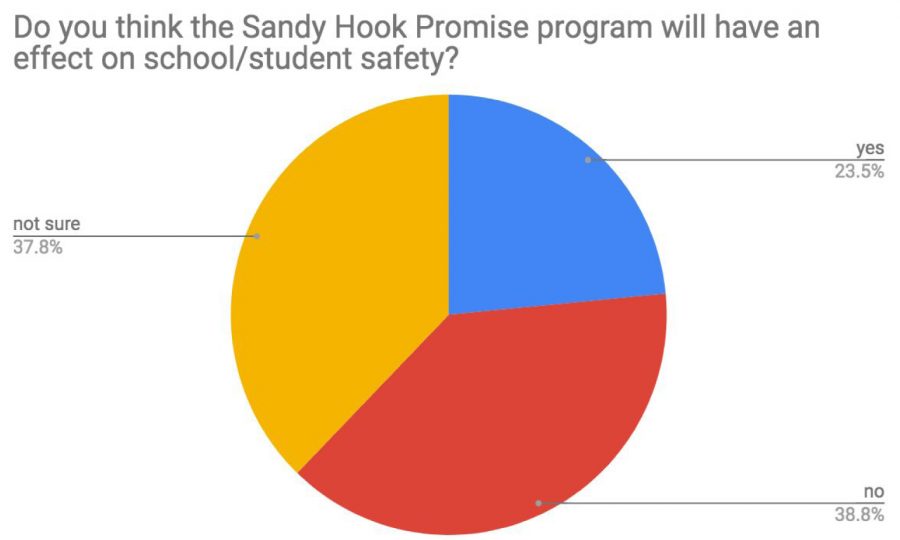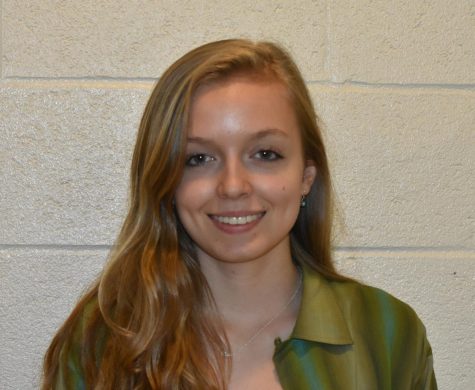Sandy Hook Promise encourages conversation
In a survey of 100 Grady students, only 23% of students felt “Say Something” would improve school safety.
February 4, 2019
Atlanta Public Schools implemented the Sandy Hook Promise “Say Something” Anonymous Reporting System in hopes of improving school safety and security. Grady introduced students to the program during an advisement following the winter break.
Sandy Hook Promise is a nonprofit organization started by several families whose children were affected by the Sandy Hook Elementary School shooting in 2012. With schools being the second highest risk location for mass shootings according to FBI data, many see the need to take preventative action.
“I learned about [Sandy Hook Promise] last year because of our ‘Go Team,’” Principal Dr. Betsy Bockman said. “Two moms came and talked to us about it back then, so that’s when I really started learning about it. We, as the ‘Go Team,’ said to them ‘Wow, this is so great, you need to take it to the safety and security department at APS.’” Grady’s “Go Team,” is a school governance group composed of administrators, teachers, community members and a student representative.
Sandy Hook Promise says its mission is to “prevent gun-related deaths due to crime, suicide and accidental discharge, so that no other parent experiences the senseless, horrific loss of their child.”
The organization has created a free anonymous reporting system, “Say Something,” in hopes of providing students with a way to report suspicious, dangerous or concerning behavior among their peers.
“I think it’s very, very valuable in helping people feel confident that they have the power to prevent violence, to help people who need help in schools,” social studies teacher Christopher Wharton said. “It showed them how to do that confidently and anonymously, if they feel safer doing so.”
However, this is not reflected in students’ perceptions of the program. In a survey of 100 Grady students, only 23 percent of students thought “Say Something” would improve school safety.
Grady launched the system with an hour-long presentation in advisement that detailed a three-step guide to reporting potentially-threatening behavior: look for signs, act immediately and with seriousness and say something to a trusted adult. The presentation featured videos, visuals and interactive quizzes.
Not all students took away the intended message from the presentation, with some saying it did not motivate them to report things directly to the school.
Forty three percent of students said they would use the “Say Something” reporting system, with 23 percent saying they would not and 33 percent saying they weren’t sure.
“If something happened, I would go directly to someone instead of reporting something anonymously,” senior Carrie Miller said. “If I’m being honest, I would tell my friends first, then either their parents or my parent. I wouldn’t tell the school unless it was school-related.”
She also said some of the warning signs outlined in the presentation, such as sad posts on social media, don’t always warrant reporting.
“Everyone says depressing stuff on social media,” Miller said. “I can’t report everyone. It’s hard to know if they’re really being serious, or they’re just sad about something.”
Wharton thinks “Say Something” is a valuable tool for students, but also he has some concerns.
“The only drawback is it can give the perception that ‘Oh, if you just do this, you will be okay,’ and we know that real life doesn’t always work that way,” Wharton said. “But I think the reason they do it is to let you know that statistics show that when you do say something and act on situations that are concerning, people do tend to get help and it does help prevent violent situations.”
According to Dr. Bockman, the reporting system has already seen some success.
“In the weeks since we have launched this, there have been five things that we have been notified about,” Dr. Bockman said.
The day after its Jan. 9 launch, an anonymous tip from a Grady student was reported at 5:30 p.m. and processed through Sandy Hook Promise’s Florida office.Thirty minutes later, Dr. Bockman received a call from APS dispatch notifying her of the tip and that the district’s Safety and Security department was evaluating it.
For Dr. Bockman, the most important aspect of “Say Something” is that it prevents students from carrying information and feeling personally responsible.
“If someone says they are doing self harm or talked about suicide or something like that, I hate that other students are carrying that knowledge,” Dr. Bockman said. “With the suicide that we had last year, there was a lot of that guilt and that’s long lasting. I like that there is a way to immediately report it, because I do not want you all feeling responsible. That is why I like this program the most.”








